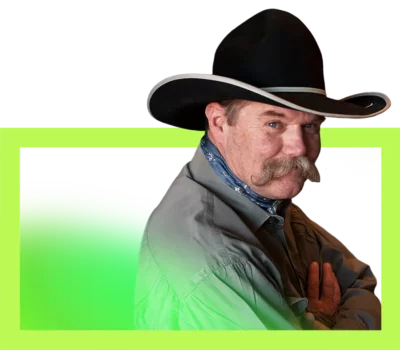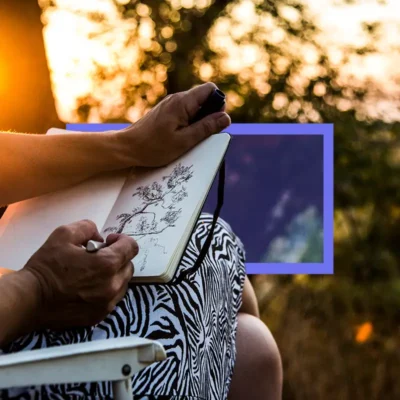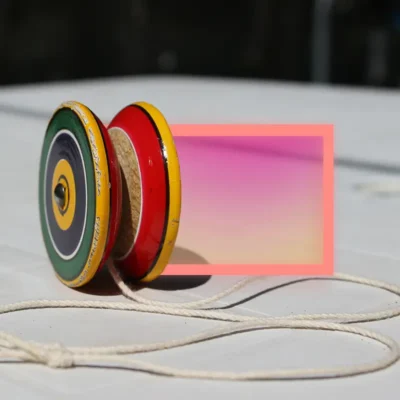A cowboy’s rules for living
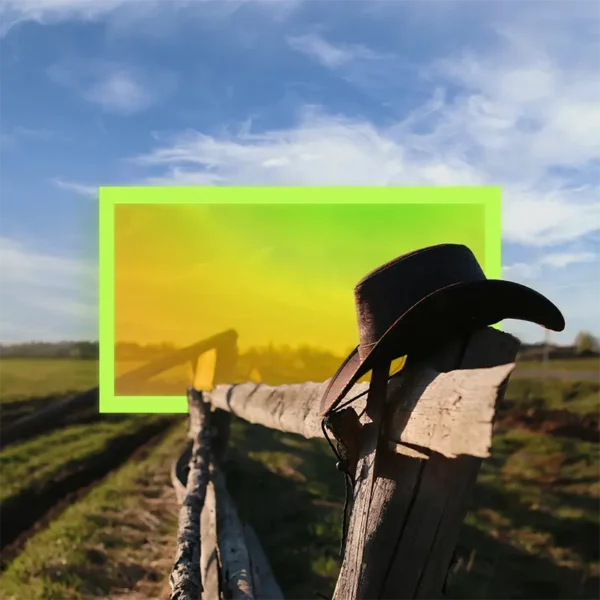
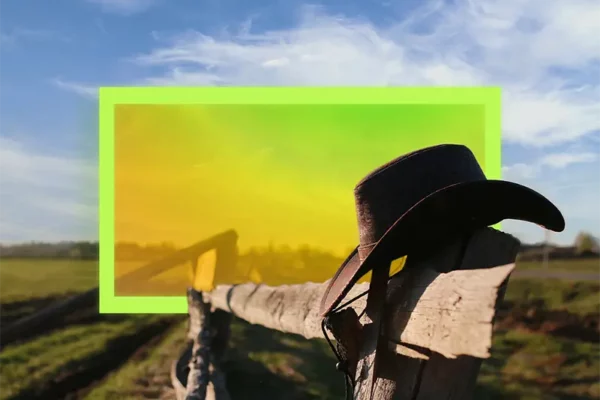
Table of Contents:
Transcript:
A cowboy’s rules for living
WADDIE MITCHELL: The only thing that gets me away from the cowboy life is getting drafted. I’m 20, and there’s Vietnam. And when I get back, they have me run a ranch for the army at Fort Carson. I get married, and five years later we have our first child – the first of five – all girls except four of ‘em. And I start managing a ranch in Roland, 100 miles from anywhere. And I realize, good golly, I am responsible for this little critter. It fills me with anticipation, and doubt and dread and with a fright. It fills my being with questions: What do I do? Can I do it? Am I supposed to have something to teach the boys?
ROHAN GUNATILLAKE: Waddie Mitchell is one of America’s most beloved cowboy poets. Growing up on his father’s ranch in Elko, Nevada, he watched the cowboys around him with awe, absorbing their stories, their manners, listening, observing and learning. In today’s Meditative Story, Waddie captures the sounds and smells of life on a ranch, and shares with us the sense of honor, adventure, and freedom that so captivated him as a child.
In this series, we combine immersive first-person stories and breathtaking music with the science-backed benefits of mindfulness practice. From WaitWhat and Thrive Global, this is Meditative Story. I’m Rohan, and I’ll be your guide.
The body relaxed. The body breathing. Your senses open. Your mind open. Meeting the world.
MITCHELL: It can get pretty cold on a ranch at 7,000-foot elevation. You live in sync with the seasons. Weather is what it is, but you work with it and through it. There’s no snow days, holidays, or vacation when you are the stewards of living animals. Freezing, scorching, wet, and a million chunks flung at you by hail doesn’t change the job needing done. You learn early to tough through it, almost become part of it. Being a horseback with the buckaroos is what I live for. Sometimes we go up Sherman Peak, which is almost 12,000-foot high. I see a mountain lion up there. I get to rope a big ol’ mule deer buck up there too. The more I’m out there, the more I love it.
The ranch seems huge to most folks – lots of country – but in reality it’s just a family place with lots more acreage than we can use. The lack of water to irrigate more hay meadows and to feed cows through the winter is the only thing that keeps us from getting bigger.
Our family ranch starts in, I think, 1873. Over the years it serves as a stage stop, a Pony Express stop, and a post office. Dad seldom has more than four men working at the ranch. Them guys all call me Waddie – Little Waddie, because I always wear a hat. A waddie is a cowboy. And all I want is to be a cowboy. A buckaroo.
There are a couple bachelor brothers John and Kincaid Reed that are there off and on. Both are a huge influence in my life. Good hands in their mid- to late twenties. I had followed a number of wagons, mustanged, rode broncs, and just about everything I aspire to do.
They teach me how to shoe a horse. They help me start my first colt. They teach me how to act around a crew of men. What’s rude in the branding pen. They are what I want to be.
Meals take place around a 10-foot-long table with lots of chairs. I have four sisters, but they don’t eat with the men. It’s just my dad, the ranch hands, and myself. Mom and the girls come in with big platters of food and put it on the table.
The ranch never has a separate cook house and dad never hires a cook. So my mom does it all. She would put out a substantial breakfast. Biscuits and gravy, meat, eggs, hotcakes and coffee. Our dinner – it’d be what city folks call lunch – it’s a big meal in the middle of the day. We’ve already put in a morning’s work and still have all afternoon to go. There are roasts or steaks and potatoes, and beans, vegetables, and bread or rolls. Then, in the evening for supper, we have light meals so as not to go to bed with a full belly.
We don’t have electricity so no TV, which means we do the strangest things at night: We talk to each other.
After supper we sit around the table and exchange stories. ’Course no one thinks of them as stories, just a good old-fashioned BS session. Somebody might tell us about an outfit they worked on, and a horse there that bucked them off. Or about that guy tipping a tractor over while building a road and losing an arm. About things that are significant in life, adventures. Every once in a while, someone recites a poem.
My dad always has great World War II and Korea stories. He never talks about the war. Just the funny things that went on around the war.
Each person tells their story in their own way. Often self-deprecating or funny or about a dangerous situation. Some were on the edge of raunchy. Seldom, though, did that talk get somber.
It’s almost an obligation to join in and share a story when you lived like we do. I don’t say much. I don’t want to get sent off to bed. But I get to listen. Being there at the table – and that is a privilege.
GUNATILLAKE: Can you sense the excitement in Waddie’s body, his attention making his head rise and lean forward? Absorption. Breathe with Waddie as he listens to the stories. Let everything else go, just for this moment. Whatever else you are thinking of can be dealt with later. For now, just let this Meditative Story wash over you, receive it without any feeling of having to respond or react. Give yourself permission to just be here.
MITCHELL: By the time I’m eight, I’m on a full schedule of chores. I feed the leppie pen calves out of a bucket. I get the milk cow in and milk her. I milk some for the barn cats and a little for the dogs, then take the house milk in and strain it through a filter into a gallon mayonnaise jar.
We let the cream rise overnight, and scoop it off the top in the morning, and put it and the milk in the creek to stay cool. We make our butter and ice cream with it. The only time we get to make ice cream though is in the wintertime, because that’s the only time we have ice for the churn.
When I turn 12, I get to sleep in the bunkhouse with the men as long as I’m quiet and don’t get in the way. I take that serious ’cause it’s a big deal for me to stay out there where I can listen.
The bunkhouse smells like cigarettes and pipes, cigars, and wood smoke. Talk is kept low, spare, no loud voices. It has to do with common courtesy, a rule without ever being written down or spoke of.
Each guy has a bunk, his bedroll, his warsack, and a couple of hooks above the bed to hang his clothes. The only real job in there was to clean the sink out when you got done washing in it, sweep around your bunk now and then. And to me, this is all important stuff, the little details that go along with the big things.
At night l lay on my bunk quiet, and I relish every minute that I get to listen to the buckaroos talk. One night, a guy named Curley Bill Johnson starts in to recite a poem out of nowhere. It’s about a cowboy that has a horse called Badger. They’d been together for a long time, had lots of adventures and, like happens, they got awful close. But the horse was getting old and not up for the rigors of the wagon’s works, so he decides to turn Badger out on good pasture for the season.
Now, there’s what you call a candy boy on a big outfit. His job is to bring out supplies and the mail to the wagon and other outlying camps and take our letters back. Well the cowboy has been out with the wagon about two months, and hasn’t been in to see Badger. The candy boy comes out, unloads supplies, and just before he leaves, looks over and says, “Oh, yea, I forgot to tell you, your horse wire cut and died.” And then he just drives off.
When that candy boy turns back from his pickup window and tells him about his horse – just the cold indifference of him saying that with no compassion, my 12-year-old heart just breaks. A cowboy can love a horse. All of us in the bunkhouse know that.
I’ve got big old tears welling up in my eyes. I peek around, because I don’t want the buckaroos to see me crying. But nobody looks at anybody. There’s a few guys probably holding back tears themselves. I recognize then that poetry is part of being a cowboy, being able to do that. And from that day on, I start reading poetry in earnest.
GUNATILLAKE: As Waddie describes, listening with your full being can be a powerful tool for connecting with yourself and the world. Drop any reactive thinking, let your attention be soft and open your awareness to the music of the world in this moment, in this place. If your sense of being expands, notice that.
MITCHELL: The closest settlement to us is Jiggs. It’s a ranching community thirty-some miles from us. It’s where I go to school. Jiggs has a bar, a community hall, the Mound Valley volunteer fire department truck and a schoolhouse. It’s the mecca for the ranching area. The school is one room with one schoolmarm, and typically has about 11 kids, first through eighth grade.
’Course they can’t run a bus out that far for so few, so by the time I’m 9, I drive my sisters to school in an old 1957 Willys Jeep station wagon. I lose sight of the road a little bit every time I use the clutch. And remember the old compression windshield wipers that almost come to a stop going up a hill, and then about beat themselves to death going down. Kids driving to a country school is not uncommon and nobody thinks twice about it.
After the eighth grade, I board in town for high school. And that means I’m away from everything I know and love. There’s 240-some kids in that high school, and I don’t savvy their ways. And they sure as heck don’t make me feel welcome. I’m the last one picked in PE and I guess I don’t blame ’em. Ranch kids don’t learn how to play organized sports. But all the same, city kids don’t know how to ride a bronc or rope a calf or run equipment or pull a calf or start a young horse or well, lots of other things.
By 16 I figure I’m way too smart for school anymore, and I get a job to go out with the Seven S chuck wagon. They are a big outfit, and for a young buckaroo like me, it is heaven. I learn a lot that season. Buckaroo life gets me hooked.
Most of the buckaroos are let go for the winter, but I am lucky and they keep me on to start the colts this winter. That is a scary thing for a horse. Think about it: through all the millennia they have evolved, they were prey, and so their natural instinct is always to flee from a threat. What you try to do is make them feel safe and better off around you than they’d be somewhere else.
Starting colts involves figuring out where that horse’s mind is, so you can understand what that horse needs to make its world calmer. You want to make it the horse’s idea. That comes from some technique, but mostly it comes from listening, listening to the whole thing through the horse’s body, listening through the horse’s mind, and then listening through your fright, and your sense of feeling unworthy.
These are big horses, 5, 6-year-olds. A lot of the big outfits would wait that long to start their horses, figuring they need to get what they call good and leggy, so they can handle those 60-mile-a-day circles at mostly a trot. That’s important.
I do my best to make friends of them, and I do all the things I can to keep them from killing me and killing themselves. And that keeps me busy. And it keeps me interested and happy.
The only thing that gets me away from the cowboy life is getting drafted. I’m 20. And there’s Vietnam. And when I get back, they have me run a ranch for the army at Fort Carson. I get married, and five years later we have a child – the first of five, all girls except four of ’em – and I start managing a ranch in Roland, 100 miles from anywhere. And I realize, good golly, I am responsible for this little critter. It fills me with anticipation, and doubt and dread, and with a fright.
It fills my being with questions: What do I do? Can I do it? Am I supposed to have something to teach the boys? I figure out I do and I will. I want to start writing. That helps me to think things through. But what will I write about? My wife says to write about what you know, being a cowboy. The stories that I didn’t even consider stories that were fed to me by my dad or the cowboys that worked at the ranch.
There was an ignorance of the past and a disregard for the future that made it all feel so vivid and vital. For that very reason – it was natural. It was only itself – it was what we were doing.
Had I known what I know now, I might have taken it all down. I might’ve put all these cowboys’ ideas and stories down. But at that time, living that lifestyle, I just didn’t think it was ever gonna end.
I’ve been a professional poet for over 30 years now, and if there ever was a recipe a feller could use to write good poetry, I’ve never found it. It’s the same with cowboying, and like those suppers at my dad’s ranch house, and breaking colts, I get to just listen.
Listen for the things we have in common. Listen for the tune of the story. And that’s what makes a poem hit me – the music and heart in that language. I guess it comes down to being pretty simple in the end. If it moves you – if you can smell it, if you can feel it – it works. That is what poetry is supposed to do, and that’s what I’ve been trying my best to write for a long time now.
Rohan’s closing meditation
GUNATILLAKE: The image that stays with me the most from Waddie’s story is that of starting colts. The newly minted cowboy training the young horses, taming them to be ridden, to work.
Meditation is training the mind, and while traditionally teachers might talk about the mind being like a monkey or a puppy, I like colt: the wildness, the energy, the sheer lack of interest to have anything to do with being trained, in the first instance at least.
So with body relaxed, hands soft, let’s see what this colt, this wild thing is like.
Watch your mind. Watch your colt. Keeping it on the rope of your attention, watch it move and buck and shuffle. Watch your mind do what it does. It might be energetic, full of thought chains, set off by Waddie’s story. Or distracted, caught up in what’s happening next in your day.
However it is, watch your mind at the end of the line of your awareness. Your own body steady and stable, hands soft but firm. Let your mind, your colt be how it is. Just be here, a steady presence. Going with it if there’s energy, but showing them you’re here whatever. Staying present, even if the mind bucks.
Waddie talked about making friends with the colts. So while watching your mind and its energy, be friends with it, even if it’s all over the place. Friends can be like that sometimes. Minds, too. Watching the mind, being present with it, being friends with it, may mean that the colt has started to settle down. If so, go with that. Be present to that. And with your hands still on the rope, walk in closer.
Be with your mind, however it is. Let it be how it is. And each time it settles down a little bit more, step closer. Over time the mind does calm, though it never really does become tame. But I’m sure Waddie would agree with me, we need that little bit of wildness.
Thank you and go well.
